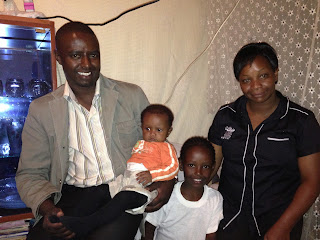El Transito is a small fishing village on the Pacific coast of Nicaragua that was practically wiped out by a devastating Tsunami in 1992. Since then the small community has struggled to become sustainable and provide enough resources for the families still living there. An organization called
NicaFund has spent the last 10 years helping to provide more resources and opportunities to the community of El Transito. Friday morning I met Claudia Tinoco, the Nicaragua Country Director for NicaFund. In less than 10 years, NicaFund has helped El Transito build better roads, installed a well, create a feeding program and educational program, built a baseball field, provided jobs for the community, and set up community service projects where locals who participate receive assistance building their own homes. Although NicaFund has primarily worked in El Transito, they have begun a similar model in some communities outside of Managua.
Claudia took Johnny and I on the 1 1/2 hour drive to El Transito Friday morning, warning us that the roads can get a little rough, especially on a rainy day. Lucky for us the day stayed dry; I have no idea how anyone gets anywhere there when it's raining. At one point we had to cross a small stream to get to our destination. The stream turns into a river if rain gets heavy, which is usually daily now during the rainy season.
NicaFund has made so much positive impact in the community of El Transito that it's hard to imagine what the community would be like without them. The best part about NicaFund's work is they are not making changes independently, but rather empowering the people of the town to become self-sustainble. One example is a community development program, where locals are able to help with community service and in return earn large cut stone slabs to build their own homes. Saturday we were able to join a local community service project cleaning up the El Transito Pacific Coast as part of an International coast clean-up. Jonathan, NicaFund's El Transito local Director, is so dedicated to his job that he facilitated the beach clean-up while sick with Dengue Fever. Jonathan and Claudia, along with the the other NicaFund staff are doing great work in El Transito. They have plans to grow their model to many other communities in Nicaragua, and I have no doubt they are the organization to make that happen.

Claudia Tinoco, NicaFund Country Director, assisting Claudia Aburto, Food Program Supervisor, preparing for the local Feeding Program.
Claudia Aburto, pictured here with her family in front of their home. Claudia has been able to build her entire home with the help of NicaFund's community development program that allowed her to gain stone slabs.
Volunteers assisting with the International Coastal Clean-up day, including Jonathan Butcher, NicaFund El Transito Program Director.
Getting around El Transito however possible.
Claudia Tinoco in the Community Feeding Program Kitchen built by NicaFund.
My new favorite drink, Jamaica tea, made from Hibiscus flower.
Claudia Aburto outside of the school and feeding program supported by NicaFund.











































